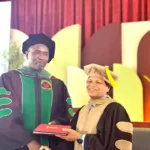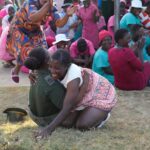A political storm is brewing in Zimbabwe as conflicting narratives emerge regarding President Emmerson Mnangagwa’s potential bid for a third term.
While loyalists within Zanu-PF continue to push for a constitutional amendment extending his presidency beyond 2028, prominent constitutional law expert Lovemore Madhuku has declared such a move virtually impossible. This clash of opinions highlights the deep divisions and complex legal hurdles that lie ahead.
This initiative is proceeding on a three-pronged strategy: securing a Zanu-PF resolution for constitutional change, utilising a splinter faction of the Citizens Coalition for Change (CCC) led by Sengezo Tshabangu to ratify the amendments, and generating widespread public support for the subsequent referendum.
However, Madhuku, in a recent interview with Open Parly, painted a starkly different picture. He outlined the arduous legal process required to amend the constitution, emphasizing the significant challenges involved. “I think I can say that it is almost impossible. Legally yes you can go through the steps, but once you know what those steps are, you realise that it’s almost impossible,” Madhuku stated.
He detailed the process, highlighting the necessity of publishing the initial Bill, allowing for a 90-day public debate, parliamentary approval with a two-thirds majority in both the National Assembly and the Senate, and finally, a national referendum requiring a majority “yes” vote.
Madhuku argued, “We should then vote yes with a majority. Now, that alone tells you that it will be very difficult because I know that in the 90-day period for debate and so on, it will come out very clearly that most Zimbabweans don’t support it and when it goes to Parliament, we’re not sure how they will vote.”
He further pointed out the uncertainty surrounding Zanu-PF’s ability to secure the necessary two-thirds majority in Parliament, even with their current dominance. Even if they succeed, the referendum would be a direct vote on Mnangagwa’s continued presidency, a prospect Madhuku believes the President himself would likely oppose.
“That is in respect of the first Bill and then, with a referendum voting yes or no, it will just be a referendum on President Mnangagwa and I don’t think that he wants it. It doesn’t matter how you couch the Bill. When you then go to the stage of voting yes or no, it will be very simple. Do you want the President to continue or you would want the President to serve 10 years? So most people that respect the President would simply want him to rest after 10 years. So when you say possible, I think it might be a very loose word.”
Madhuku emphasised that while the Constitution outlines procedures for amendment, achieving the required thresholds would prove exceptionally difficult. He also highlighted the President’s own role in the process: “So that will be with the Bill number one and then for it to then be signed into law, the President must sign it into law. So Mnangagwa himself will be the one who has to put his signature for the approval to the amendment of the Constitution.”
This final point underscores the inherent contradiction within the proposal: the President would need to sign the very legislation that would allow him to surpass constitutional term limits.
He stated that the process would commence upon receiving the necessary instructions. He also justified the potential amendment by citing the public’s desire for Mnangagwa to continue his leadership, particularly to oversee the completion of ongoing development projects.
Ziyambi’s comments revealed a more optimistic outlook: “My comment is that it is possible to do so (make the amendments) when the time is right, when we get the instructions to do so. We also have to know that Zimbabwe is a democracy guided by the will of the people. So, if the people say they want the President’s term extended, so be it, that’s what democracy is all about,” he said.
He further added, “Once the people who voted him into office have spoken, the necessary legal requirements will be put in place. What I can say is it is possible to make the necessary constitutional amendments.”
He stated, “If we approve your (President Mnangagwa) stay in power and the people of Zimbabwe are happy, let it be,” adding, “We are Zimbabweans, we should be singing together, playing together, celebrating together. When I walk out of here (Pricabe Farm) I will face criticism and it does not matter because it improves us as Zimbabweans…when we go to Parliament, I can assure you that we are going to unpack the blueprint to bring the people of Zimbabwe together. We need to coexist and live together.”
This unexpected support from a segment of the opposition adds a new dimension to the debate, raising questions about the political motivations behind Tshabangu’s stance. The conflicting viewpoints of Madhuku and Ziyambi, coupled with Tshabangu’s surprising endorsement, create a highly charged political atmosphere, leaving the future of President Mnangagwa’s tenure uncertain and the path towards any constitutional amendment fraught with significant hurdles.

Follow @MyZimbabweNews












